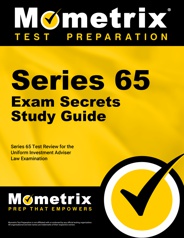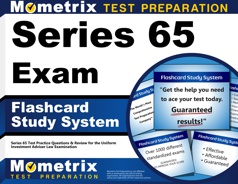The Investment Advisers Law Examination (Series 65 exam), administered by the Financial Industry Regulatory Authority (FINRA), is used to assess your knowledge and abilities to perform adequately as an investment adviser.
Click “Start Test” above to take a free Series 65 practice test!
Series 65 Exam Outline
The Series 65 exam contains 140 questions, ten of which are unscored, and you are given a time limit of 3 hours. The unscored questions, which are called “pretest” questions, are used by the exam administrators to evaluate questions for future versions of the exam. The pretest questions are unmarked and mixed amongst the scored questions, so you will not know which are the pretest questions.
The exam is split into four sections:
I. Economic Factors and Business Information (15%)
The 20 scored questions in this section test your knowledge of various aspects of business and economics.
Basic Economic Concepts (6 questions)
- Inflation and deflation
- Monetary and fiscal policies
- Economic indicators
- Business cycles
- Geopolitical and global factors
- Interest rates
- Yield curves
- Credit spreads
Financial Reporting (4 questions)
- Financial reporting
- Fundamentals of accounting
Analytical Methods (4 questions)
- Descriptive statistics
- Valuation ratios
- Time value of money concepts
- Financial ratios
Types of Risk (6 questions)
- Opportunity cost
- Systematic risks
- Unsystematic risks
- Capital structure including liquidation priority
II. Investment Vehicle Characteristics (25%)
The 32 scored questions in this section test your knowledge of various characteristics of investments.
Cash and Cash Equivalents (1 question)
- Insured deposits and money market instruments
Fixed Income Securities (3 questions)
- Corporate bonds
- Foreign bonds
- Asset-backed securities
- US government and agency securities
- Municipal bonds
Valuation Factors and Characteristics of Fixed Income Securities (3 questions)
- Tax implications
- Liquidation preference
- Duration
- Bond ratings
- Coupon vs. zero coupon
- Yield-to-call
- Credit spread
- Conversion valuation
- Discounted cash flow
Types of Equity Securities (2 questions)
- Employee stock options
- Restricted stock
- Common stock
- Preferred and convertible preferred stock
Characteristics of Equity Securities (3 questions)
- Dividends
- Shareholder rights
- Resale restrictions
Determining the Value of Equity Securities (3 questions)
- Fundamental analysis
- Discounted cash flow
- Technical analysis
- Dividend discount
Types of Pooled Investments (3 questions)
- Unit investment trusts
- Real estate investment trusts
- Private funds
- Mutual funds
- Exchange-traded funds
Characteristics of Pooled Investments (3 questions)
- Fee structures and other costs
- Liquidity
- Benefits and risks
- Share classes
- Tax implications
- Pricing
Types of Derivative Securities (2 questions)
- Futures
- Options
- Warrants
- Forward contracts
Characteristics of Derivative Securities (3 questions)
- Costs
- Benefits
- Risks
Alternative Investments (2 questions)
- Leveraged funds
- Viatical/life settlements
- Limited partnerships
- Exchange-traded notes
- Structured products
- Inverse funds
Insurance-Based Products (2 questions)
- Life insurance
- Annuities
Other Assets (2 questions)
- Commodities
- Precious metals
- Investment real estate
III. Client Investment Recommendations and Strategies (30%)
The 39 scored questions in this section test your knowledge of various types of clients and what investment recommendations you should make.
Type of Client (3 questions)
- Trusts and estates
- Individual
- Natural person(s)
- Sole proprietorship
- Foundations and charities
- Business entities
Client Profile (7 questions)
- Risk tolerance
- Financial goals and objectives
- Time horizon
- Client data gathering
- Current and future financial situation
- Nonfinancial investment considerations
Capital Market Theory (3 questions)
- Investment theories and hypotheses
- Investment models
Portfolio Management Strategies, Styles, and Techniques (6 questions)
- Tactical asset allocation
- Capital appreciation
- Active and passive styles
- Diversification
- Dollar-cost averaging
- Volatility management, sector rotation
- Puts and calls
Tax Considerations (2 questions)
- Individual income tax fundamentals
- Corporate, estate, and trust income tax fundamentals
- Gift tax fundamentals
Retirement Plans (3 questions)
- Qualified retirement plans
- Nonqualified retirement plans
- Individual Retirement Accounts
ERISA Issues (2 questions)
- Investment policy statement
- Fiduciary issues
- Prohibited transactions
Special Account Types (2 questions)
- UTMA/UGMA
- Education-related
- Health-savings
Ownership and Estate Planning Techniques (3 questions)
- Beneficiary designation
- Qualified domestic relations order
- Pay-on-death
- Transfer-on-death
- Trusts and wills
- Methods of ownership transfer
Trading Securities (4 questions)
- Role of broker-dealers, custodians, exchanges, and market makers
- Terminology
- Costs of trading securities
Portfolio Performance Measures (4 questions)
- Current yield
- Returns
- Relevant benchmarks
IV. Laws, Regulations, and Guidelines Including Prohibition on Unethical Business Practices (30%)
The 39 scored questions in this section test your knowledge of various laws and regulations, with some specific focus on prohibition and unethical business practices.
Regulation of Investment Advisers (6 questions)
- Registration and post-registration
- Investment adviser representative supervision
- Definitions of an investment adviser
- Notice filing requirements
- Exemptions for exempt reporting advisers and private fund advisors
Regulation of Investment Adviser Representatives (4 questions)
- Registration and post-registration
- Definition of an investment adviser representative
Regulation of Broker-Dealers (2 questions)
- Definition of a broker-dealer
Regulation of Agents of Broker-Dealers (2 questions)
- Definition of a broker-dealer agent
Regulation of Securities and Issuers (2 questions)
- Registration and post-registration
- State antifraud authority
- Definition of securities and issuers
- Exemptions
Remedies and Administrative Provisions (2 questions)
- Authority of state securities administrator
- Administrative actions
- Other penalties and liabilities
Communication with Clients and Prospects (10 questions)
- Performance guarantees
- Correspondence and advertising
- Disclosures
- Client contracts
- Unlawful representations concerning registrations
Ethical Practices and Fiduciary Obligations (11 questions)
- Custody conditions and obligations
- Compensation
- Cyber security, privacy, and data protection
- Client funds and securities
- Business continuity plan
- Conflicts of interest
- Criminal activities
Check Out Mometrix's Series 65 Study Guide
Get practice questions, video tutorials, and detailed study lessons
Get Your Study Guide
Registration
If you are employed or associated with a FINRA member firm, the firm can register you for the exam via a U4 form. If you are not employed or associated with a FINRA member firm, you can open an enrollment window via FINRA’s Test Enrollment Services System (TESS). The exam fee is $187 regardless of which method of registration you choose.
Once your registration request is processed, you will be notified and given a 120-day window to take the exam.
Series 65 Online Prep Course
If you want to be fully prepared, Mometrix offers an online Series 65 prep course designed to give you everything you need to succeed!
Here’s what you’ll find in the Series 65 course:
- 50+ Review Lessons Covering Every Topic
- Over 550 Series 65 Practice Questions
- 300+ Digital Flashcards
- Money-back Guarantee
- Mobile Access
Everyone learns differently, so we’ve tailored the Series 65 online prep course to ensure every learner has what they need to prepare for the Series 65 exam.
Click below to check it out!
Test Day
The Series 65 exam is administered at Prometric testing centers across the country. You should arrive at the testing center 30 minutes before the scheduled exam time. If you arrive late, you will not be able to take the exam.
Once you arrive at the testing center, you will be asked to provide a valid, government-issued photo ID. If you forget to bring your ID or if your ID is invalid, you will not be allowed to take the exam.
Before you enter the testing room, you will be asked to leave all personal items in an assigned locker. Personal items include your cell phone, bags, hats, wallets, food, books, notes, and pencils. You will be asked to roll back your sleeves and pull up your pant legs.
Once you are in the testing room, you will be given a four-function calculator, a small whiteboard, dry-erase markers, and noise-canceling headphones. After the exam begins, you will be allowed to take a break. However, the timer will not be paused during your break.
Scoring
Your test score is placed on a scale with all other test-taker’s test scores, and adjustments are made to the score to account for variations in difficulty. You will receive a preliminary score report as soon as you finish the exam.
You will need to answer at least 92 of the scored questions correctly to pass the exam.
Check Out Mometrix's Series 65 Flashcards
Get complex subjects broken down into easily understandable concepts
Get Your Flashcards
Study Tips
How to Study Effectively
Your success on Series 65 test day depends not only on how many hours you put into preparing but also on whether you prepared the right way. It’s good to check along the way to see whether your studying is paying off. One of the most effective ways to do this is by taking Series 65 practice tests to evaluate your progress. Practice tests are useful because they show exactly where you need to improve. Every time you take a free Series 65 exam practice test, pay special attention to these three groups of questions:
- The questions you got wrong
- The ones you had to guess on, even if you guessed right
- The ones you found difficult or slow to work through
This will show you exactly what your weak areas are and where you need to devote more study time. Ask yourself why each of these questions gave you trouble. Was it because you didn’t understand the material? Was it because you didn’t remember the vocabulary? Do you need more repetitions on this type of question to build speed and confidence? Dig into those questions and figure out how you can strengthen your weak areas as you go back to review the material.
Answer Explanations
Additionally, many Series 65 practice tests have a section explaining the answer choices. It can be tempting to read the explanation and think that you now have a good understanding of the concept. However, an explanation likely only covers part of the question’s broader context. Even if the explanation makes sense, go back and investigate every concept related to the question until you’re positive you have a thorough understanding.
Comprehend Each Topic
As you go along, keep in mind that the Series 65 practice test is just that: practice. Memorizing these questions and answers will not be very helpful on the actual test because it is unlikely to have any of the same exact questions. If you only know the right answers to the sample questions, you won’t be prepared for the real thing. Study the concepts until you understand them fully, and then you’ll be able to answer any question that shows up on the test.
Strategy for Series 65 Practice
When you’re ready to start taking practice tests, follow this strategy:
- Remove Limitations. Take the first test with no time constraints and with your notes and Series 65 study guide handy. Take your time and focus on applying the strategies you’ve learned.
- Time Yourself. Take the second practice test “open book” as well, but set a timer and practice pacing yourself to finish in time.
- Simulate Test Day. Take any other practice tests as if it were test day. Set a timer and put away your study materials. Sit at a table or desk in a quiet room, imagine yourself at the testing center, and answer questions as quickly and accurately as possible.
- Keep Practicing. Keep taking practice tests on a regular basis until you run out of practice tests or it’s time for the actual test. Your mind will be ready for the schedule and stress of test day, and you’ll be able to focus on recalling the material you’ve learned.
FAQs
Q
How many questions are on the Series 65 exam?
A
There are 140 questions on the exam.
Q
How long is the Series 65 exam?
A
The time limit for this exam is 3 hours.
Q
What is the passing score for the Series 65 exam?
A
To pass the exam, you will need to answer at least 92 questions correctly.
Q
How much does the Series 65 exam cost?
A
The exam fee is $187.



